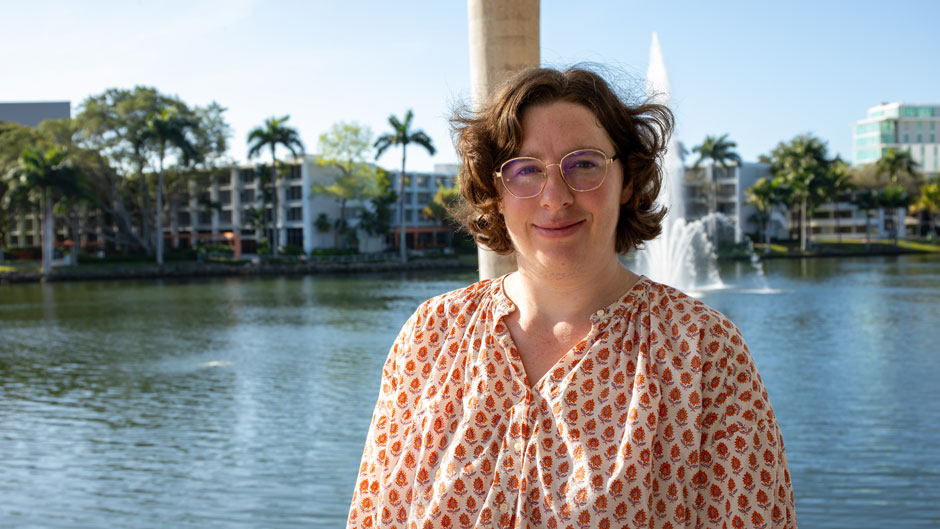While she was working on her Ph.D. in English during the height of the COVID-19 pandemic, Alexandria Morgan began to worry about finding a job after graduation.
“During the pandemic, I panicked about career prospects. I started doing informational interviews on Zoom with anyone who had a Ph.D. in English or the humanities,” said Morgan, a recent doctoral graduate from the English department at the University of Miami’s College of Arts and Sciences.
“I talked to a lot of people who worked in editing and publishing,” she added. “One person at the National Endowment for the Humanities said, ‘I think you’d find grants interesting. Look into grant writing.’”
As luck would have it, the Office of Corporate and Foundation Relations in the University’s Development and Alumni Relations division was seeking a UGrow fellow for a position that required some grant writing and editing. This office works with faculty throughout the grant application process, from finding funding opportunities that fit with their goals, to applying (writing, editing, and liaising with budget and financial teams), to reporting back to the foundation about the work achieved with their support.
As Morgan was entering her fifth year of studies, she applied for the UGrow fellowship.
UGrow (Graduate Opportunities at Work) is a program within the College of Arts and Sciences that provides on-campus work opportunities in various University divisions to humanities graduate students.
Tim Watson, professor of English, helped develop the program in 2015 while he was serving as an associate dean for program development. He wanted to ensure graduate students had the opportunity to explore alternatives to tenure-track academic jobs, particularly in light of the nationwide scarcity of humanities teaching jobs.
While humanities graduate students usually teach introductory courses in their respective academic departments as part of their degree requirements, UGrow instead places students across the University, giving them experience beyond research and teaching.
Applications open each spring for doctoral students in English, history, modern languages and literatures, and philosophy, as well as M.F.A. students in creative writing. Four to six students are selected annually through a competitive process, according to Joshua Cohn, the senior associate dean for research and graduate education in the College, who manages the program.
Morgan was accepted to the fellowship program for the 2021-22 academic year under an agreement allowing her to work online from Tucson, Arizona, where she had recently moved. Her writing and editing skills came in handy in her new position.
“I’ve always really enjoyed editing. It’s something I’ve kept with me from my time as a teacher, where you’re teaching students how to improve their writing,” she said. “Now, I use that ability to help faculty members writing their grant applications.”
In addition to grant writing and editing, Morgan leveraged the knowledge gained through her digital humanities experience to aid her new team in the development of a database for corporate and foundation grant opportunities.
“We’d thought about creating a database like this for a long time,” said Shane Karas, director of corporate and foundation relations and Morgan’s supervisor. “When Alex joined, the skills that she brought helped our team to build out the database a lot quicker than we expected.”
By all measures, the database has been an overwhelming success. “We have received feedback that it is one of the best of its kind in the nation,” said Karas.
Maintaining and managing the database is labor intensive; it requires constant updating. “It’s not a static list that we can create and just leave,” Karas explained.
As funding opportunities shift and change, Morgan is responsible for updating the database with the most recent information.
The Corporate and Foundation Grant Opportunity database is now a sophisticated, user-friendly resource. It currently holds over 1,400 funding opportunities for graduate students, medical students, postdoctoral fellows, and University faculty to peruse. The listed grants start at $10,000, often offering much more money to qualified applicants.
After her fellowship year, Morgan stayed on with the Office of Corporate and Foundation Relations. She worked there as a student employee while completing her dissertation project.
Morgan successfully defended her dissertation in December 2023. “The Embodiment of Negative Desires in Early Modern Women’s Poetry” uses a queer-feminist approach to explore the representation of bodies in the work of Lucy Hutchinson, Katherine Philips, and Aphra Behn.
Upon concluding her studies, Morgan immediately transitioned into a permanent position as associate director of corporate and foundation relations.
The new career path rewards her sense of curiosity and keeps her on her toes.
“I am constantly learning about other kinds of research being done at the University, which I find really interesting and engaging,” she said.

